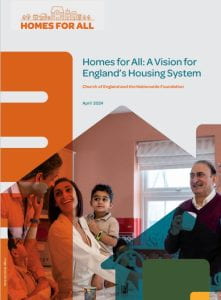 SPS Professor Alex Marsh explains why this new report makes a distinctive intervention in the housing policy debate.
SPS Professor Alex Marsh explains why this new report makes a distinctive intervention in the housing policy debate.
In 2023 the Church of England and the Nationwide Foundation decided to join forces to collaborate with the aim of offering a distinctive intervention in the housing policy debate. They approached the UK Collaborative Centre for Housing Evidence (CaCHE) to work with them on this. SPS’s Professor Alex Marsh, a CaCHE co-investigator and its systems theme lead, collaborated with CaCHE Director Professor Ken Gibb and Dr Alice Earley, both of Glasgow University, and David Orr CBE, former CEO of the National Housing Federation, to support the Church of England and the Nationwide Foundation to deliver the project.
The main output of this project – the report Homes for All: a vision for England’s housing system – is published today. The report has been welcomed and received public support from a broad range of stakeholders in the housing policy community.
The report is distinctive in several ways. Three characteristics stand out.
First, the report eschews policy recommendations. Rather than add to the already long and diverse list of such recommendations, it argues instead that what we need is to change the conversation. Homes for All argues that a key ingredient missing from the English housing policy conversation is a clearly articulated vision of what “good” looks like. Can we establish cross-party agreement regarding what we are trying to achieve? The report offers a vision of a “well-functioning housing system”. This draws on research evidence and conversations with stakeholders from across the political spectrum and the housing policy community. This vision provides us with an orientation for assessing future policy proposals: do they move us closer to achieving a well-functioning system?
The word ‘system’ has already been mentioned several times and this is the second way in which the report is distinctive. It is not novel to view housing as a system; it is a system that is interconnected in complex ways with a range of other important systems – health, social security, the labour market, and so on. The report seeks to take these characteristics seriously. We need not only more systemic analysis but also more consciously systemic governance of housing. Central government has a key role to play in this by providing system leadership: convening and carrying with them the public, private and not-for-profit stakeholders who will play a role in delivering the system transformation needed.
The third feature of the report is that not only is it forward looking and long-term – system transformation will take a generation – but it also argues that the architecture of housing governance should be reformed to ensure that housing policy has sufficient focus, priority and urgency to deliver transformational change. One of the weaknesses of housing governance over the last two decades has been the lack of stability and consistency in policy and the lack of priority given to housing across Government. Policy in pursuit of the long-term goal of a well-functioning housing system cannot be subject to sharp changes of direction nor be driven by ideology rather than effectiveness. Reforming the governance of housing is necessary to deliver the required coherence and constancy of purpose. The report proposed several reforms including the introduction of a Housing Strategy Committee to provide challenge to government policy proposals to ensure they continue to align with the long-term goal. This will learn from the experiences of the Climate Change Committee, which plays an analogous – though distinct – role in relation to the net zero agenda.
The report launched today covers a lot of ground, but much of the supporting analysis and argument has not been included. There will therefore be a complementary academic report published through CaCHE in due course. This offers a broader discussion of the systems and futures thinking that sits behind the main report.
The Homes for All report can be downloaded here.


